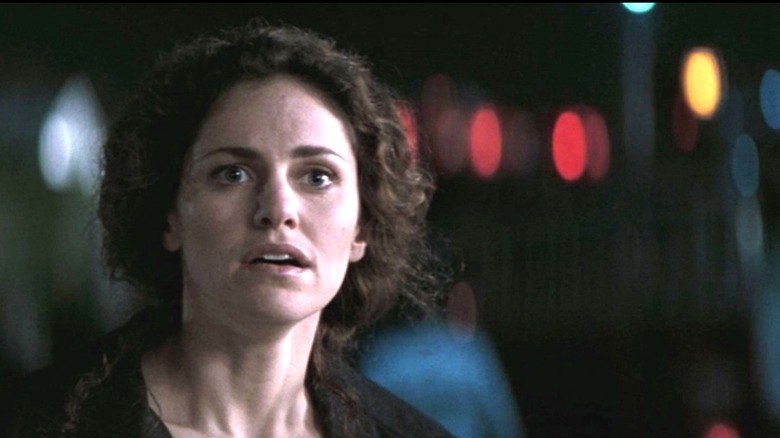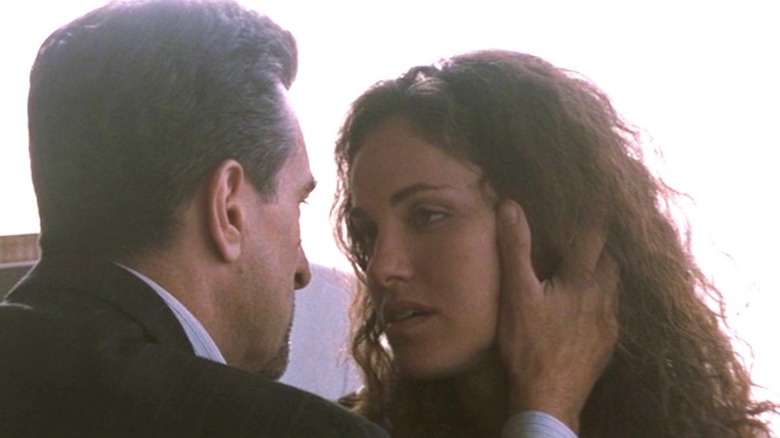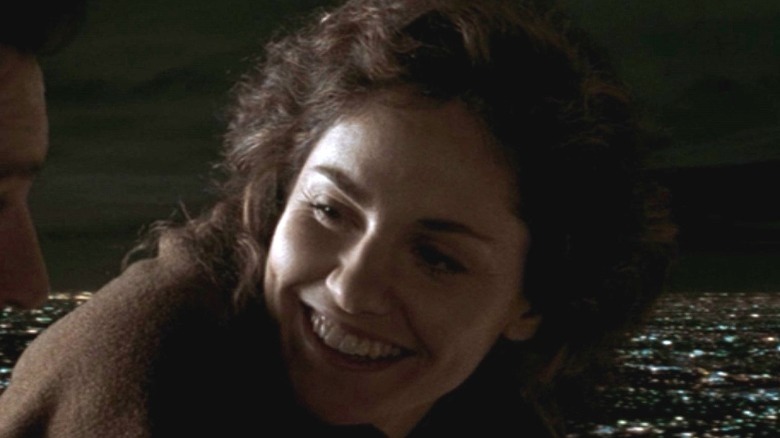One Sentence Was At The Core Of Amy Brenneman's Heat Character
While Michael Mann is one of the most exhilarating filmmakers of the last 40 years, he does have a pretty undeniable weakness in his body of work: He isn't terribly great at creating female characters. What disguises this a little is he casts his women extremely well, from Madeleine Stowe in "The Last of the Mohicans" to Viola Davis in "Blackhat," but you would be fighting an uphill battle to claim any of these women are fully fleshed out human beings.
Michael Mann makes movies about men. They are men burdened by an overwhelming weight of emotional and psychological baggage that channel everything they have into their work because it is where they feel most assured. No Mann film better exemplifies this as his 1995 masterpiece "Heat," the story of cop Vincent Hanna (Al Pacino) on a collision course with criminal Neal McCauley (Robert De Niro). That film essentially is a love story between two men on different sides of the law destined for each other because nobody else understands how they feel. The women in these men's lives are people they want but know their work will always be prioritized. As Neal McCauley puts it, "Don't let yourself get attached to anything you are not willing to walk out on in 30 seconds flat if you feel the heat around the corner."
Amy Brenneman was tasked with playing Eady, the love interest to De Niro's McCauley. Basically, all we know about Eady is that she's a graphic designer who lives in Los Angeles. If you are reading that screenplay looking for character details to latch onto, you are not going to find much. Eady exists solely in relation to McCauley. So, how does Brenneman figure out how to dig into that character? Well, Mann crystallized that in one sentence.
Playing hope
Eady meets Neal McCauley at a diner while he's reading a book about rocks and minerals. You know ... like a weirdo. For some reason, she is drawn to this odd, stoic man, and they fall for each other. Amy Brenneman had some trouble figuring out why Eady would be doing the things she was doing, creating a backstory for her that could possibly explain these things. At an Academy Q&A moderated by Christopher Nolan, she recalled how Michael Mann put Eady into a context she could understand:
"Yeah, I mean I looked at the script, I thought she must be pretty f****d up. ... I thought, well, she's probably got a little damage, you know, a little daddy stuff, a little incest, I don't know ... [Michael] said, 'Tell me everything you're thinking about,' and I said some of these things, and I will always remember this: Michael looked right at me and he said, 'No. She just falls in love with him.' And it was really a beautiful moment, and you know I thought, as most of us here I was a huge fan of 'Last of the Mohicans,' and I was like, well, anything this guy — it was a surrender. And a sort of letting go into a romanticism and a myth, and I thought, oh, I am the aspirational hope, you know, of a person like Bob [De Niro]. And I'm a person in my own right, but I sort of let go of a certain psychological dissecting and really into the hands of the whole thing."
Mann plainly lays out that what Brenneman should be playing is purely in relation to De Niro. Figuring out the "why" of Eady is not the focus of the story. She loves him, and that's that.
Women as ideas
Despite the limited psychological reality of Eady, Amy Brenneman turns in a great performance, delivering exactly what Michael Mann asks of her. It is a little tough to shake that she is another in a long line of women in films whose only purpose is to serve the needs of the principal male character, a trope that goes far beyond the movies of Michael Mann. You can find this in every genre, from the grittiest of crime thrillers to the wackiest of comedies.
On some level, I understand this. Narrative feature films, in general, have an incredibly narrow point of view. Everything that happens in the film either happens to or because of the central character, revealing further layers to them as it progresses. Because of that, most supporting characters, regardless of gender, do not have a tremendous amount of depth to them. However, male supporting characters tend to be able to connect with the protagonist in a variety of different ways, as friends, business associates, antagonists, wild cards, and more. Women, on the other hand, are love interests. They provide emotional support to the doting partner to a male main character or act as an idyllic symbol of hope and escape for him. Sometimes it's both, which is pretty much the case in "Heat."
This wouldn't be as much of a problem if there was equity between films with male and female leads. Unfortunately, the sample pool of leading women flanked by one-dimensional men is a puddle compared to the ocean of the reverse. The trope is frustrating because far too often, they're the only parts women are given in movies, and actors tie themselves in knots trying to make them meaningful. Amy Brenneman was phenomenal as Eady, but there should also be movies where she's the Neal McCauley.


